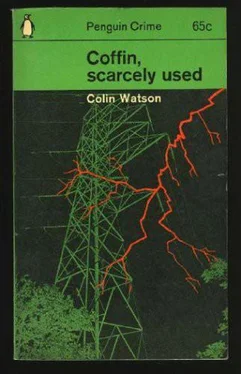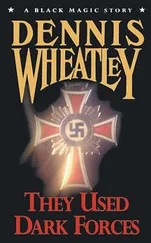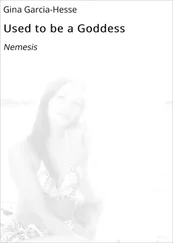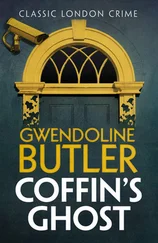“Mr Bradlaw?”
“The undertaker, you mean? They were on good terms. They could do each other a certain amount of mutual good through the newspaper, of course. Advertising on one side, and help with lists of mourners and so forth on the other. It’s a common enough arrangement, I believe.”
“Was there anyone apart from those three with whom Gwill was on intimate terms?”
“Not since my husband died. And always excepting his guilty association with me, of course.” Mrs Carobleat sipped her tea and eyed Purbright over the top of the cup.
After another quarter of an hour of being stolidly inquisitive to no perceptible effect, Purbright rose and said: “You understand that I have no right at the moment to ask you this, but would you be willing just the same to let me have a look round your house?”
This, at any rate, seemed to find Mrs Carobleat unprepared. She looked at him doubtfully and said she couldn’t quite see why, but he could if he really wanted to. He smiled apologetically and motioned her to lead the way.
The rest of the house proved to be as tidy, expensively furnished and well tended as the room they had left. Purbright and Love silently followed Mrs Carobleat, who only once turned in time to catch the inspector closely examining a power point.
He also showed interest in a small leather travelling case containing brushes and shaving equipment that lay on the dressing table of one of the only two bedrooms that showed signs of regular occupation.
“Those were Harold’s,” she said expressionlessly. Purbright nodded and turned away.
Chapter Ten
On the morning following the publication day of the Flaxborough Citizen , an early telephone call was put through to the police station by George Lintz. Purbright had been in his office since the time he judged the first postal delivery would be made at the newspaper. He now hurried over to Market Street.
Lintz let him in and handed him fourteen letters addressed to the box numbers specified in the advertisements that had been inserted on his uncle’s directions. An hour remained before members of the staff would begin to arrive. Purbright and Lintz settled into chairs in a small office on the first floor and waited for a kettle to boil on a gas ring in the fireplace.
The first envelope from which the flap curled back at the persuasion of steam and the somewhat self-conscious inspector, contained a typewritten sheet and eight one-pound notes. The letter read:
Dear Sir,
In response to your ad. I shall be pleased to call Tuesday at 7.45 p.m. to see goods as specified (Japanese antique newel, ebony) and enclose cash entitling me to first refusal of same. If inconvenient, kindly send card.
Yours faithfully,
H. L. BIRD
The address at the top was 14, Burtley Avenue, Flaxborough. Purbright read the letter through twice and handed it to Lintz. “Bird...isn’t that the agricultural machinery fellow?” Lintz looked at the address and nodded.
“What do you make of it?” Purbright had selected another letter from the pile and was carefully passing it to and fro across the gently steaming spout.
Lintz shrugged. “He must be interested in antiques, I suppose. Not that I would have suspected Harry Bird of tastes in that direction. The money side of it is rather odd, isn’t it?”
For answer, Purbright held up another bundle of notes that he had extracted from the second envelope. He counted them. There were eight. “Standard rate, apparently,” he remarked and smoothed out the accompanying letter.
Dear Sir (it ran),
Re your advert, in this week’s issue, I wish to inspect goods on Thursday evening at 8 sharp. For preference Superior Antique Lampstand but would consider Jap Oak Antique Newel. Deposit herewith.
Yours truly,
N. SMITH
The address was Derwentvale, Pawley Road, Flaxborough.
“Who’s N. Smith?” Purbright asked, showing Lintz the letter.
“If he lives at that address, he’s Councillor Herbert Smiles.”
“A doubly cautious buyer of antiques. Deals with box numbers, and even then gives a false name. The cunning old councillor.” Purbright sounded far away. He was steaming another envelope with tender concentration as if it were a trout.
Once more he drew out notes—again eight. The letter followed the pattern of the first two, except that it contained a number of spelling mistakes. The signature, as far as Purbright could decipher it, was R. Ocklom. The address was that of a shop in Harbour Road. Lintz said he thought it was a newsagent’s and that it was an accommodation address. Purbright set to work on a fourth letter.
At the end of half an hour, the whole batch had been carefully disembowelled. Purbright took a large sheet of paper and began making a table of the various features of the correspondence. In the first column he set the name and address of each writer. In the second he put the date and time of the projected interview or appointment. The third received a description of the article that appeared to have been offered for sale.
Having completed this list, he restored the contents of all the envelopes, re-gummed the flaps and sealed them. Lintz took the bundle and returned the letters to the post box in the downstairs office.
A few minutes later, the first members of the newspaper staff came in. Avoiding them, Purbright and Lintz crossed the landing and went into the editor’s own room. Somebody found the abandoned kettle, shook it and gratefully made some lumpy cocoa with its contents as a prelude to a dreary morning of preparing in advance the following week’s ‘What’s On in Flaxborough’.
Purbright did not stay longer than was demanded by courtesy to one who now seemed less a suspect than a fellow conspirator. He enjoined Lintz, a little guiltily, to keep the oddities of Boxes CS.441/4 to himself and to place no obstacle in the way of the letters themselves being collected by anyone who might call for them. “But ask your people to make sure and remember who it is,” he added.
Back at the police station, Sergeant Love wanted to know if the inspector thought it wise to have allowed Lintz to be a spectator of the letter opening.
“I don’t see why not,” Purbright replied. “After all, if he is involved, and if this antique business has a bearing on his uncle’s death, it would be absurd for Lintz not to have used his position as editor to squash the whole thing. He had the opportunity to swipe Gwill’s ledgers. He could have cooked up some simple explanation of the advertisements even after we had become suspicious. And there was nothing to stop him pretending that there had been no replies. Lintz might be fly, but I should be very surprised if he has a clue as to what old uncle was up to.”
“Yet even so, that wouldn’t rule him out as the fellow we’re looking for. The box reply racket may have nothing to do with the murder.”
Purbright smiled. “In those letters that I’ve just steamed open there was money totalling a hundred and twelve pounds. When cash of that amount comes floating down into a murder case, you don’t need to do much cherching of femmes or looking into family cupboards. Now then, let’s see what we can make of all this.”
He spread out his tabulated digest of the box replies.
“Quite a social register,” Love remarked as he glanced down the first column. “Are they genuine, do you think?”
“I’m sure they are. One or two are hiding behind false names, but they’re pretty half-hearted deceptions. The addresses are real enough. Can you think why? That’s the first point to consider.”
“How do you mean?”
“Well, the natural assumption is that the business, whatever it is, is shady. These respectable citizens must know it. Yet they pass cash over mostly genuine signatures and under entirely genuine addresses. That isn’t quite what one would expect.”
Читать дальше












